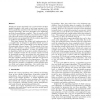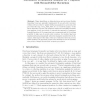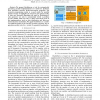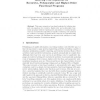769 search results - page 2 / 154 » Analysis of recursively parallel programs |
PPOPP
1999
ACM
14 years 1 months ago
1999
ACM
Divide and conquer algorithms are a good match for modern parallel machines: they tend to have large amounts of inherent parallelism and they work well with caches and deep memory...
TACAS
2010
Springer
14 years 4 months ago
2010
Springer
Many algorithms on data structures such as terms (finitely branching trees) are naturally implemented by second-order recursion: A first-order procedure f passes itself as an arg...
DATE
2010
IEEE
14 years 2 months ago
2010
IEEE
—We present Huckleberry, a tool for automatically generating parallel implementations for multi-core platforms from sequential recursive divide-and-conquer programs. The recursiv...
CONCUR
2006
Springer
14 years 1 months ago
2006
Springer
We extend a previous type system for the -calculus that guarantees deadlock-freedom. The previous type systems for deadlockfreedom either lacked a reasonable type inference algorit...
IFL
2003
Springer
14 years 2 months ago
2003
Springer
Abstract This paper presents a type-based analysis for inferring sizeand cost-equations for recursive, higher-order and polymorphic functional programs without requiring user annot...




